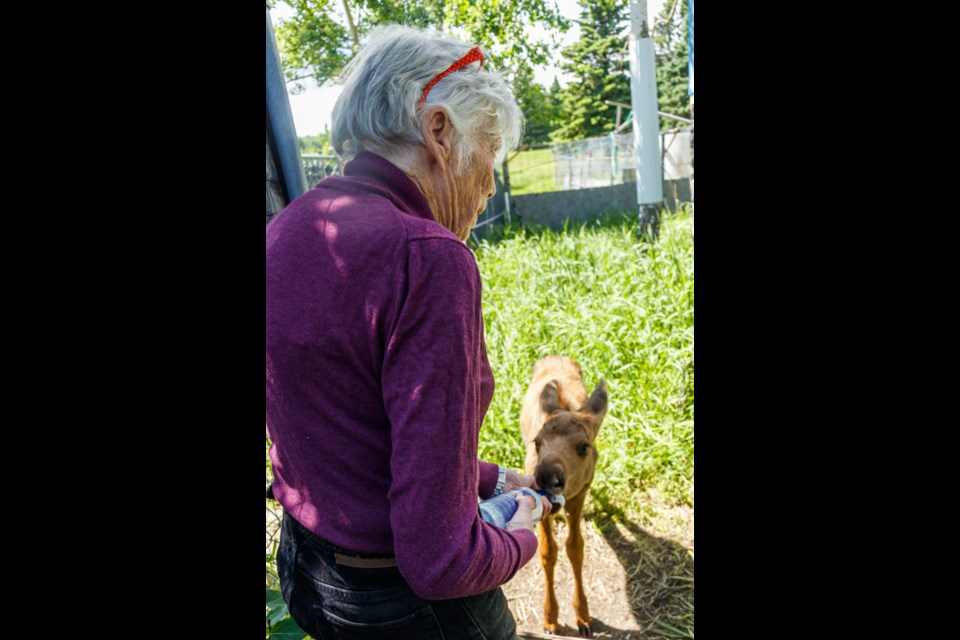COCHRANE— Roughly 30 kilometres northwest of Cochrane sits a 140-acre plot of land that has become a home to a litany of injured or orphaned animals.
The Cochrane Ecological Institute houses felids, ungulates, canids, ursids, reptiles and birds for the purpose of rearing and rehabilitating the creatures before they are released back into the wild.
Unfortunately, the organization has found itself struggling due to the restrictions imposed by the COVID-19 pandemic, as many of its revenue streams have been impacted.
Every year, due to the expansion of human civilization into wild spaces, the number of injured or orphaned wildlife increases, and the need for organizations like the Cochrane Ecological Institute increases as well.
Unfortunately for many of the animals, it is not within the provincial government's mandate to directly deal with these orphaned or injured indigenous wildlife, said Clio Smeeton, the president of the Cochrane Ecological Institute.
Which is where the Institute steps in.
“Both the federal government and the provincial government, Alberta Wildlife & Parks, Alberta Environment and Parks, issue approved wildlife rehabilitation centres with Wildlife Rehabilitation permits which allow them to rescue injured or orphaned wildlife on behalf of the government but at no cost to the government,” Smeeton said in an email interview.
Because of the structure of the system in Alberta, many of these organizations are left to fend for themselves.
“All wildlife rehabilitation centres operating under federal and provincial government permits have to raise the funds to pay for what they do,” Smeeton said. “Fundraising is becoming more difficult, while the numbers of orphaned or injured wildlife we treat become greater and greater.”
The Cochrane Ecological Institute is a registered charity and traditionally relied on its established for-profit social initiative, Happy Tails Pet Retreat.
Happy Tails is a kennel for cats and dogs to stay in while their owners are away and unable to care for them. The kennel has even housed rabbits and turtles, Smeeton noted.
They also relied on grants and donations from various foundations, Albertans and Albertan businesses, said Smeeton.
“Up until March 17th, 2020 this worked perfectly,” she said. “People could leave their pets with us while they went on holiday and all the day to day costs of looking after injured or orphaned wildlife were covered. But once COVID-19 struck no one was going on holiday and no one was boarding their pets, so that reliable revenue stream has definitely been affected.”
The Cochrane Ecological Institute also regularly engaged in various educational outreach programmes, like housing overseas students, and welcoming students from local schools for tours and field trips.
Many of those programmes have also been put on hold due to the pandemic.
Lisa Dahlseide, the financial director of the Cochrane Ecological Institute said that the organization is currently rethinking the programmes they offer.
In an email interview, Dahlseide said that after reading through the school board’s re-entry protocols, the Institute is considering altering the way it would aid students in learning about the natural spaces around them.
“The idea is to meet the students outside the school and walk around their school and the surrounding neighbourhood to discuss coexistence with local wildlife, teach them about some of the urban plants and how wildlife utilize them, how wildlife finds shelter, and what to do if the students find injured or orphaned wildlife,” she explained.
Bussing students for field trips is currently prohibited, and the Institute currently has an orphaned bear cub on site. As per Alberta Environment and Parks regulations, the Institute is not allowed to have public tours at the facility while a cub is under its care, explained Dahlseide.
She noted that the staff at the Institute understands that schools have also been “financially hit hard,” and that they were considering offering programming in exchange for a donation, as opposed to the usual flat rate for the service.
“Teachers and schools tend to prefer having a set rate, but the donation offer gives them flexibility,” Dahlseide said.
The Cochrane Ecological Institute is currently planning a fundraiser near the end of November.
“The annual winter fundraiser is a Christmas tree event,” said Dahlseide. “People come on a weekend and we have pre-cut trees they can choose from and purchase by donation.”
She explained that the event is not only a fundraiser for the Institute but doubles as an environmental rehabilitation project. So while you get a Christmas tree for the holidays, you can also help fund a habitat restoration program.
“The spruce forest is naturally growing into the grasslands, but there is a herd of bison on the land that requires the grazing habitat, thus this fundraiser also pairs with a habitat restoration project to maintain some grazing land for the herd of bison,” said Dahlseide.
If you want to help the Cochrane Ecological Institute without waiting for Christmas time, you can make a donation online at any time at ceinst.org/.




